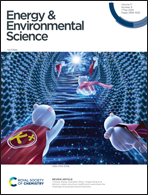Regulating dielectricity of a polymer electrolyte to promote cation mobility for high-performance solid zinc hybrid batteries†
Abstract
Solid polymer electrolytes (SPEs) offer the advantages of suppressing uncontrollable dendrite formation and the hydrogen evolution reaction (HER) at the Zn metal anode of Zn-based batteries, providing good electrochemical stability and a high working voltage. However, the low ionic conductivity of SPEs does not meet the performance demands for the high-power density of Zn-based batteries. In this study, we first regulated the high dielectric constant (εr) and the ferroelectric domain of the host polymer frameworks to promote salt dissociation and ion transportation, thereby enhancing the ionic conductivity and cation mobility of SPEs. Specifically, a high ionic conductivity of up to 1.07 mS cm−1 was achieved by utilizing the SPE based on poly(vinylidene fluoride-co-trifluoroethylene-co-chlorotrifluoroethylene) [(PVDF-TrFE-CTFE)] (referred to as PVTF). The as-fabricated symmetric Zn‖Zn batteries based on the PVTF SPE could exhibit splendid cycling stability for more than 210 days (>5000 h). When paired with a cathode, the developed solid rechargeable Zn hybrid batteries can operate at high power up to a 10C-rate and exhibit stable cycling for 1000 cycles at 2C. This work illustrates that regulating the ferroelectric domain with a higher εr of SPEs is an effective strategy to enhance the ionic conductivity and transport ability, showing great prospects for their practical application in Zn-based batteries.



 Please wait while we load your content...
Please wait while we load your content...